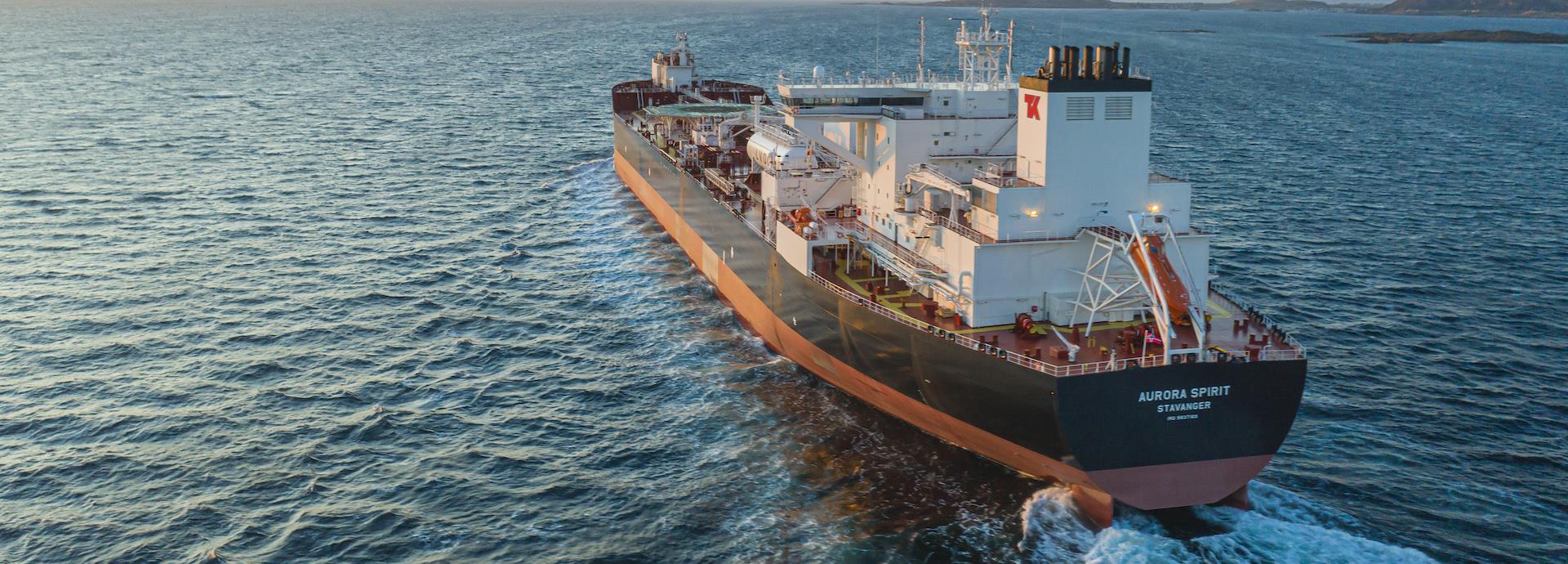

Promising 47% lower emissions and fuel costs of just under half of its diesel equivalent, the world’s first dual-fuel e-shuttle tanker aims to deliver environmental and economic benefits.
The Aurora Spirit, launched at Samsung Heavy Industry’s shipyard in South Korea, is the first of six new-generation e-shuttle tankers ordered by Altera Infrastructure, formerly Teekay Offshore, and developed in close collaboration with Wärtsilä.
What makes the Aurora Spirit revolutionary is its “flexible utilisation of different energy sources to achieve a very efficient design and operation,” says Egil Hystad, General Manager, Power Systems at Wärtsilä, who worked on the ship’s concept and development.
Of particular note is the ship’s utilisation of recovered volatile organic compounds (VOC), gases that normally evaporate during the loading and unloading of oil, as well as during sailing in turbulent seas.
Such gases are normally wasted, but the Aurora Spirit instead captures the VOC and mixes them with other fuel to power both the gas turbine and the main engine. The Aurora Spirit has the potential to capture 100 tonnes per trip, accounting for 30-40% of the total energy the ship requires.
Dual-fuel tanker runs on LNG and VOC
The result is a shuttle tanker that can run on liquefied natural gas (LNG) and VOC – and potentially other greener alternatives in different combinations, depending on the ship’s mission and the availability and cost of each fuel.
Eliminating VOC emissions from cargo is estimated to almost totally eliminate SOx and particulate emissions, as well as reduce NOx emissions from engines by up to 88%.
This system makes the Aurora Spirit more energy efficient and environmentally friendly and improves its operational abilities.
“A ship like this has quite a different operational mode,” says Hystad. “If you operate a tanker full of oil when steaming from the fields over to the refinery, you need one operation mode, which is a lot of propulsion. When you’re at the field, you have to be able to keep this big ship steady, close to a buoy where they’re discharging the oil and that requires manoeuvring capability.
“These are opposing requirements and the flexibility of having electric distribution is that you produce the energy as electricity and then distribute it throughout the ship, to the different propellers and what you need.
“This creates a much higher flexibility to operate the ship efficiently in all conditions. You are engaging the necessary number of engines when you need it and you can apply the power very fast and make a high amount of manoeuvrability.”
Battery packs offer flexible power distribution
The e-shuttle tanker also features battery packs for flexible power distribution and blackout prevention, which reduces bunkering requirements and overall carbon dioxide emissions by about 50%.
“In a traditional ship, the propeller is controlled by a combustion engine, which has one shaft directly to the propeller, like in a car,” explains Hystad. “In this case you don’t have that.
“You use the engines only to feed the electric grid. If you have too much power, you store it in the batteries; and if you have too little, you take power back from the batteries. So, this one is instant and stabilising and gives much better performance.”
Indeed, sea trials off South Korea confirmed the batteries offset the load on the engines. In addition, the vessel’s Wärtsilä 34DF engines ran on an even 80% load and produced power on board. Even in choppy conditions, they were shown to run smoothly, while the batteries broke in and took the power peaks.
The state-of-the-art Ship Performance Monitoring System onboard the Aurora Spirit also helps ensure a smooth running of the vessel, which can help increase efficiency and significantly reduce overall operational costs for operators.
The overall design is in keeping with Wärtsila's Smart Marine approach of creating a connected ecosystem that optimises the safe movement of goods and people, while reducing waste and increasing efficiency.
Ship Performance Monitoring system for smooth operations
The average lifespan of a ship is 30 years, so future proofing to allow for regulatory changes and emissions targets – such as the International Marine Organisation’s aim for an absolute reduction in its total greenhouse gas emissions of at least 50% by 2050 – is vital.
Again, the Aurora Spirit looks to be ahead of the curve on this front, thanks to its flexible design in terms of using energy sources. “You can also imagine that we are able to, in the future, switch to even cleaner fuels – like ammonia,” says Hystad.
“Or you can use other energy sources like fuel cells… so it’s also made for future flexibility. You don’t have to build a new ship and you have the optimal, or very flexible utilisation of different energy sources, to achieve a very efficient design and operation.”
Even now, when compared to 2008, the lower emissions of the e-shuttle tanker are 30 years ahead of time in meeting the IMO targets, according to Altera Infrastructure.
But it wasn’t just the technology and design that was revolutionary, the way of working was too. Speaking last month, Johnny Larsen, Senior Project Manager at Wärtsila, said: “Just repeating old concepts and outdated designs is not enough in this modern age of strict environmental regulations, and where efficiency is more important than ever.”
It’s a sentiment echoed by Hystad, who said the ship’s concept and development was very much driven by the customer’s needs, including operational, economic and maintenance concerns and, perhaps most importantly, low emissions and future potential. In this regard, the Aurora Spirit looks to be a potential blueprint for the future.
